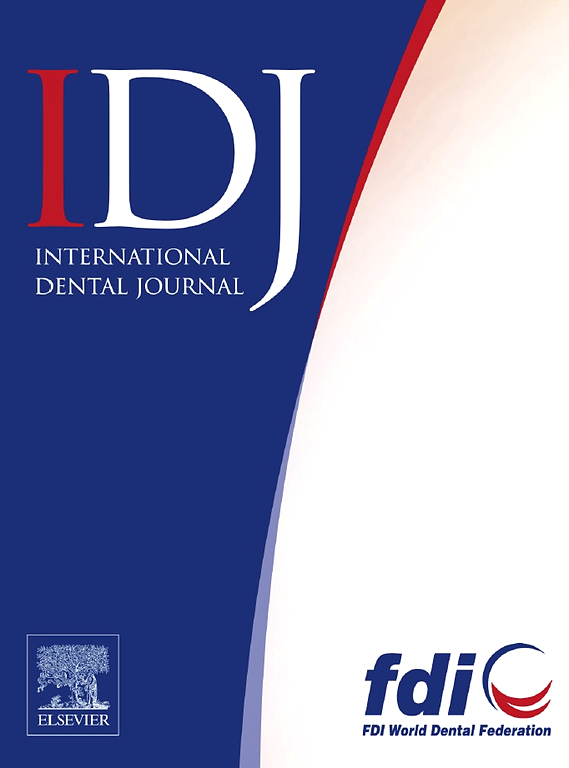泰国成人牙周健康知识与信念问卷的开发与验证
IF 3.7
3区 医学
Q1 DENTISTRY, ORAL SURGERY & MEDICINE
引用次数: 0
摘要
牙周疾病对口腔健康构成重大挑战,许多成年人对这些疾病缺乏足够的了解。本研究旨在开发和验证一份问卷,用于标准化评估成人牙周健康知识和信念(ALPHABET)。方法采用专家小组评审的方法编制了以牙周健康知识(ALPHA-K)和信念(ALPHA-B)为重点的字母表问卷,问卷最初由70个条目组成。采用验证性因子分析评估ALPHA-B的结构效度,采用α - k和α - b得分之间的预期关系评估收敛效度,采用内部一致性评估信度。一项涉及380名泰国成年牙科患者的横断面分析检查了字母表评分与患者类型之间的关系,以及与口腔健康行为的关系。结果经过优化,最终的40项字母表问卷与基础模型具有较强的拟合性,证实了其结构效度。ALPHA-K和ALPHA-B得分之间的相关性证明其收敛效度。它还显示出高可靠性,Cronbach 's alpha系数超过0.7,有利的项目-总相关范围为0.406至0.773。有牙周治疗史的患者在所有ALPHABET亚量表上的得分均显著高于新患者(P <;. 05)。逻辑回归分析显示知识和自我效能感与刷牙和使用牙线的行为都有关联。结论:据我们所知,该问卷首次验证和评估了成人的牙周健康和信念。它应该作为一种有价值的标准化工具,可能会推动干预,提高对疾病的认识,改善牙周健康结果。临床相关性本问卷旨在提高临床医生对牙周病患者观点的了解,从而提供个性化的口腔健康教育,指导有针对性的干预措施以获得更好的结果。本文章由计算机程序翻译,如有差异,请以英文原文为准。
Development and Validation of an Adult Periodontal Health Knowledge and Belief Questionnaire in Thai Adults
Introduction and aims
Periodontal diseases pose a significant oral health challenge, with many adults lacking adequate understanding of these conditions. This study aimed to develop and validate a questionnaire, designed for standardized assessment of periodontal health knowledge and beliefs in adults (ALPHABET).
Methods
The ALPHABET questionnaire, initially composed of 70 items focusing on periodontal health knowledge (ALPHA-K) and belief (ALPHA-B), underwent thorough development and validation via expert panel review. Structural validity of ALPHA-B was evaluated using confirmatory factor analysis, while convergent validity was confirmed by expected relationship between the scores of ALPHA-K and ALPHA-B, and reliability was assessed through internal consistency. A cross-sectional analysis involving 380 Thai adult dental patients examined the association between ALPHABET scores and patient types, as well as the association with oral health behaviours.
Results
After refinement, the final 40-item ALPHABET questionnaire showed a strong fit with the underlying model, confirming its structural validity. The correlations between the scores of ALPHA-K and ALPHA-B were proved its convergent validity. It also demonstrated high reliability, with Cronbach’s alpha coefficients exceeding 0.7, and favourable item-total correlations ranging from 0.406 to 0.773. Patients with a history of periodontal treatment scored significantly higher on all ALPHABET subscales compared to new patients (P < .05). The logistic regression analysis demonstrated association of both knowledge and self-efficacy with both brushing and flossing behaviours.
Conclusions
To our knowledge, this questionnaire is the first to validate and assess periodontal health and belief in adults. It should serve as a valuable standardized tool that would potentially drive intervention and raise awareness of the disease and improve periodontal health outcomes.
Clinical relevance
This questionnaire should improve clinician insights into patient perspectives on periodontal disease so as to provide individualized oral health education, guiding tailored interventions for better outcomes.
求助全文
通过发布文献求助,成功后即可免费获取论文全文。
去求助
来源期刊

International dental journal
医学-牙科与口腔外科
CiteScore
4.80
自引率
6.10%
发文量
159
审稿时长
63 days
期刊介绍:
The International Dental Journal features peer-reviewed, scientific articles relevant to international oral health issues, as well as practical, informative articles aimed at clinicians.
 求助内容:
求助内容: 应助结果提醒方式:
应助结果提醒方式:


